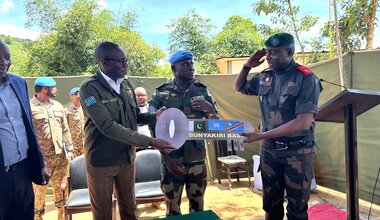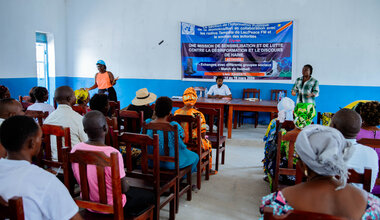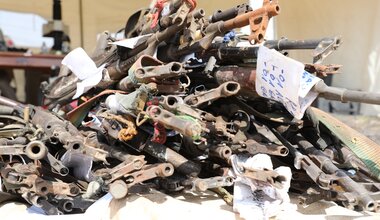Martin Kobler, Head of MONUSCO, briefs the UN Security Council on the situation in DRC
The fulfilment of the mandate of the United Nations Organization Stabilization Mission in the Democratic Republic of the Congo (MONUSCO) rested on “persistent engagement” with the Government on the security situation in the East, the electoral process and the ongoing strategic dialogue, the Security Council heard today during its periodic briefing on the subject.
On the security situation, there was “a ray of hope on one of the front lines”, Martin Kobler, Special Representative of the Secretary-General and head of the Mission said, describing ongoing military cordon and search operations conducted by the Forces Armées de la République Démocratique du Congo (FARDC) supported by MONUSCO forces against the Force de résistance patriotique en Ituri (FPRI). While the priority was to ensure that the group disarmed voluntarily, the use of force proved inevitable after the lapse of three consecutive deadlines.
However, Mr. Kobler said, joint operations against the Forces démocratiques de libération du Rwanda (FDLR) in North Kivu, South Kivu and Katanda had been at a standstill for five months. While the Congolese Government had made great strides in the past decade in restoring security, the population in East lived at the mercy of a number of armed groups. The suspension of joint cooperation by the FARDC went beyond the original question over human rights, as the Mission revised its Due Diligence Policy in that regard and was looking for ways to resume cooperation within the framework of the commitments from both sides.
Despite the progress in dislodging the FDLR from some of its strongholds, the FARDC was finding it difficult to consolidate its hold in liberated areas, he said, adding that paralysis had cascaded into other fields of operation. “Waiting is not an option,” he said.
The country would hold presidential and legislative elections in November 2016, which under the imperatives of resolution 2211 (2015) must be transparent, credible and respectful of the Constitution and the electoral calendar. The responsibility for such elections, however, ultimately rested with the Government and a number of actions were required. Urgent needs included a budget and a realistic electoral calendar. The voters’ registry needed to be updated and political space must be given to the opposition and civil society. Welcoming President Joseph Kabila’s initiative to reach out to a wide range of stakeholders to ensure consensus, he said such consultations should not delay the elections.
The strategic dialogue between MONUSCO and the Government began in March, with a view to setting in motion a gradual, mutually agreeable exit strategy and reinvigorating sincere collaboration on security, elections, human rights and communications. In May, joint missions were conducted in 29 territories across 4 conflict-affected territories to obtain first-hand understanding of the security situation prevailing in the east. The findings were now being discussed with the Government and were serving as a basis to jointly draw conclusions on how and when MONUSCO would eventually leave. The timeline for departure should depend on the progress on the ground.
While there had been progress in the fight against sexual violence in the country, violence against women and girls remained endemic. “We must ensure that the women’s bodies are not used as battlegrounds in never-ending wars,” he said, stressing the need to ensure victims had access to justice. The fight against armed groups in the country could not be successful unless the questions of economic development and employment were addressed.
Briefing the Council on her recent visit to the region, Dina Kawar, representative of Jordan and Chair of the 1533 Democratic Republic of the Congo Sanctions Committee, highlighted the paradox between the country’s extensive natural resources and its difficult path towards governance. On a number of occasions, she was reminded of the Government’s assertions of neighbouring States’ complicity in smuggling networks. The Minister for the Interior had voiced the readiness of his Government to work with the Group of Experts to provide suggested names for designations. When the Group had held a follow-up meeting, however, no such names were provided.
Surprised to hear about contention that the embargo applied to the Government and prevented it from obtaining needed weapons, she clarified that, since the adoption of resolution 1807 (2008), the embargo no longer applied to the Government.
Reiterating the Council’s call on the Democratic Republic of the Congo to enhance stockpile security and implement a national weapons marking programme, she pointed out that there had seemed to be no movement on the issue. Another outcome of the visit was to pave the way for improved communication and collaboration between the Group of Experts and the Government, United Nations and civil society members.
In Rwanda, authorities felt that the Democratic Republic of the Congo was using their country unfairly as a scapegoat for problems stemming from governance issues, she said. A key issue that had emerged during discussions in Uganda were allegations that the Allied Democratic Forces (ADF), sanctioned by the Committee last year, had links with terrorist groups such as Al-Shabaab, something the Group of Experts could not so far establish. She thanked the Government of the United Republic of Tanzania for having arrested the sanctioned ADF leader Jamil Mukulu and agreed to Uganda’s request for extradition.
Ignace Gata Mavita, Permanent Representative of the Democratic Republic of the Congo to the United Nations, said his country had delivered on the majority of its commitments to the Addis Ababa Framework Agreement, citing progress on security sector reform, consolidation of State authority in the east, the fight against armed groups, structural reform of State institutions and national reconciliation. On relations with MONUSCO, the dialogue on strategic review was ongoing and the Government expected to find common ground on outstanding issues.
Democracy was an undeniable fact in the Democratic Republic of the Congo, he said, citing the successful elections the country had held in 2006 and 2011. The independent election commission had set the calendar and made budgetary preparations for the upcoming cycle as part of its commitment to credible and transparent elections.
There were, however, obstacles that needed to be removed, including the politicization of the electoral calendar by the opposition, and challenges to be addressed, such as financing, updating the voter registry and ensuring security, he said. To that end, consultations had begun within the country and international partners should support that process without exerting undue interference. On sanctions, he stressed the need to fully establish that the arms embargo solely applied to armed groups.
The meeting began at 10:30 a.m. and ended at 11:13 a.m.
 ONU
ONU Nations Unies Maintien de la paix
Nations Unies Maintien de la paix


